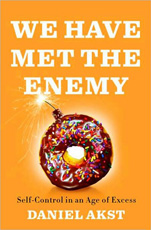"Procrastination is a classic self-control failure because procrastinators almost always have a strong second-order preference not to procrastinate. The job won't go away, after all, and putting it off won't make it any easier. Procrastination is also associated with other self-control shortcomings. In studies, procrastinators score low on self-control questionnaires and also score low for the specific personality trait known to psychologists as conscientiousness. Expressed in terms the Greeks would have used, procrastination is an example of the type of akrasia Aristotle called astheneia, or sheer weakness, in that we want to get to the task at hand, we know we should, and if we could utter an incantation to make it so, we would. But somehow we just can't muster the strength of will.
Procrastination Is a Drug
"People procrastinate in order to put off things that are unpleasant or wearisome — dreaded confrontations, burdensome homework assignments, cleaning out the garage. Jobs that are intimidatingly difficult are especially likely to inspire delaying actions. Long delays to reward — a doctoral degree six years away, for example, with no guarantee of employment afterward — also make us procrastination-prone.
"But procrastination is not just about putting off some deed — it's also about the doer. And my own theory, based on what is surely unparalleled personal experience, is that procrastinators use distraction to self-medicate when they're feeling bad about themselves, much like what Tolstoy said about why people smoke and drink: 'simply and solely in order to drown the warning voice of conscience.'
"Think of procrastination as a kind of drug: mood altering, mildly addictive, harmful in quantity, and leading to a kind of altered consciousness — the unique state of dithering into which it dispatches us. Seen in this light, procrastination can proudly claim its place in the mainstream of self-control problems, so many of which feature self-medication as a central element. Drug and alcohol addiction are obvious examples, but even obsessive-compulsive disorder involves unhealthy patterns of behavior undertaken to reduce anxiety, however momentarily. The need to lock the door or check the faucet one more time is like an itch, and it feels good to scratch."
